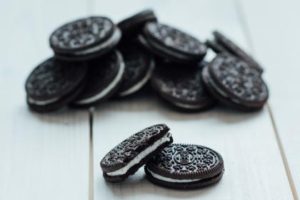
In 1991 I was at least twenty pounds overweight. I signed up for a nutrition/exercise program that I attended on my lunch hour a few times a week.
At my first class, the instructor asked what I had eaten for lunch. “A hard-boiled egg and a slice of cheddar cheese,” I responded. She looked as though I had just committed a mortal sin. “And that’s why you’re fat,” she said. “Eating fat makes you fat.”
Except, of course, now we know that it doesn’t. The pasta and rice cakes (in a category now referred to as “bad” carbs) the instructor commanded me to substitute for the fat in my diet is what made me even heavier during the few months I stuck with the program.
Was that company out to sabotage my health and weight loss? No. They were reacting to what science was showing as good dietary advice at that time.
Heart attack rates in America had been sky-rocketing, and some flawed research indicated that dietary fat was the culprit. The prepared-food industry, with dollar signs in their eyes, saw an immediate opening. That’s why we experienced a glut of products coming to market with FAT FREE! or LOW FAT! notations in bold and bright lettering. The subliminal message was, “You can feel good about buying and eating this healthy product.”
The problem was this: Fat tastes good. If manufacturers were to remove all or most of the fat, they had to substitute ingredients to add flavor. Hello, excess sugar and refined white flour.
Some health experts now believe that the “fat is bad/eat more carbs” doctrine is a primary reason why obesity and chronic health issues are so prominent today.
New research is pointing to a high carb diet as being a driver of inflammation, including brain-based inflammation. Check out the Mayo Clinic study referenced in this Tufts University link: http://www.nutritionletter.tufts.edu/issues/9_4/current-articles/High-Carbohydrate-Diets-Connected-to-Cognitive-Risk_971-1.html
Scary, right?
I am not setting myself up to be a model of a perfectly healthy eater. Saint Norma, I am not.
But I’ve learned ways to cut back substantially on my bad carb consumption. Here are a few:
- Limit portion sizes. Eat 1/3 less refined carbs than you typically do.
- Cut down the calories that you drink. That’s not just alcohol or soda, either. Many juices have the same amount of sugar as soft drinks. And some sports or energy drinks fall in that same category.
- I have next to zero will power. As in Field of Dreams (“Build It and They Will Come”), if I buy it, I will eat it. So my best tip to myself is to let the item live in the grocery store and not in my kitchen.
- Be mindful. Pay attention not just to what and how much you’re eating, but also to food labels. Food expert Michael Pollan suggests, “Don’t eat anything your great-grandmother wouldn’t recognize as food.” And the number of ingredients should be a small list of half a dozen or so items.
Sometimes I fail in my quest for eating healthy. Just last week my grocery store displayed “Thin” Oreos on an aisle end-cap. I had a flashback of attending a summertime Bible School picnic when I was nine. My mother had packed some Oreos in my bag, and the church had provided cherry Kool-Aid. That over-the-top sugary combo tasted amazing. And so I bought the cookies. I know that my brain rationalized, “But these are THIN Oreos!” Did I actually believe eating them would make ME thin? Nope. But see…the processed-food industry is still busy creating mind games!
So if you’re trying to lose weight or simply want to eat healthier, consider this post as “food for thought.” (Groan.) And please note that this is a NO ADDED SUGAR! and CARB FREE! article.
To my readers: Do you have any good advice for maintaining healthy eating habits?




Norma, you ask me for any good advice for maintaining healthy eating habits after “D” and I made ten delicious jars of peach preserves today – so that was five (5) cups of sugar. I promise to spread our eating them over a 12 month period. I may even save you a jar.
Please note that I will be inspecting your pantry when I visit and doing a jar count!
We have already given away three jars of jelly, and “D” says – NO MORE!
Also, does zucchini still count as a good carb if you make zucchini bread and also if you deep fry it?
Start your day with a smoothie made of fresh greens, water, protein powder, flax seed, an apple or two, a handful of grapes, and either some mango or strawberries.
And yes, you ARE the Smoothie Queen!
If it comes from a plant, eat it. If it’s made in a plant pass it by!
Hi Judy – thanks for commenting for the first time! Yes, this “comes from a plant” quote is another Michael Pollan gem that I enjoy.
I agree with you completely! I’ve heard that diet sodas actually increase weight gain, as do NO fat items such as cheese. Also learned that margarine was “left over food to fatten turkeys” sometime around WWII, so marketers decided to add some yellow food coloring and push it as “healthier than butter.” We now know Free Range chicken eggs are good – like avocados and nuts like almonds ( someone said peanuts are Least favorite as nuts go). Also, when we feel that “hunger pang” if we can drink some water instead of grabbing the ” skinny oreos” we can curb our appetite till the healthy stuff arrives! Ice water with a straw, or tart cherry juice water or lemon water are my favorites.
Hi Sherry – thanks for being a first time commenter! Spellcheck is telling me that “commenter” is not a word, but let’s pretend, shall we?! I think you were by my side at that Bible school picnic, so I’m sure I shared my Oreos with you! Thanks again for writing – I DO appreciate it.